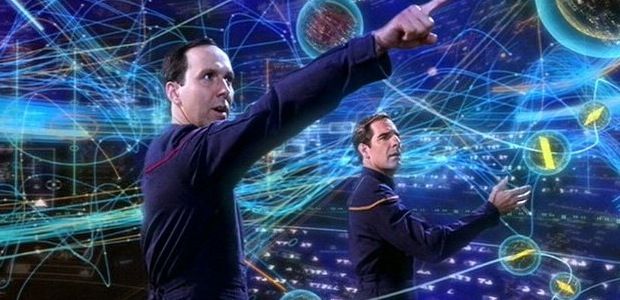There are times when you can just tell that you're not in sync with the rest of the world. For example, those times when you're watching an episode of Enterprise and thinking "Yes, this is exactly what I want from this show!" and then go online and see that very episode listed as a much-derided episode that contributed to the show's ultimate failure by scaring off viewers and turning off fans. This, dear reader, was my experience watching "Cold Front."
To me, "Cold Front" was the episode I'd been waiting for since the pilot; one that finally, finally follows up on the idea of the Temporal Cold War, gives the rest of the crew a dynamic that doesn't revolve around the Captain, Tucker and T'Pol, and suggests that the show might actually be going somewhere different from where all those earlier Treks have boldly gone before. It lacked the slack pacing and clunky dialogue of earlier episodes, and offered up a more complex conflict than we'd become used to on this show, with a legitimate question about whether or not the good guys are actually the good guys in this case (After all, neither side of the Temporal Cold War seems entirely trustworthy or even entirely evil…); I found myself watching with something approaching excitement and anticipation as to what would come next, mixed with something along the lines of stunned amazement that this was all actually happening on Enterprise, a show I'd started to consider entirely flawed by this point, struck down by blandness and indecision.
It's worth pointing out that the blandness problem may actually be in large part the fault of Scott Bakula, as much as it pains the Quantum Leap-loving fan I was to say that; Bakula's Jonathan Archer encounters things that should be truly surprising and disorientating to him in this episode, including the fact that he's caught in a battle being fought across time by two sides from his own future, but his reaction is barely present. I suspect he was going for "stoic," but it comes across as "not paying attention" or, at best, "bored." That said, Tucker and T'Pol are similarly blank when it comes to emotional range, which ends up a real problem considering those are the core three characters of the show. Compare their lack of reaction to the glee of Travis and Hoshi upon realizing that they were the senior officers on the bridge, or the Doctor upon getting to visit another ship; their reactions are wonderful, humanizing and make us care more about them… something that, even at this late stage in the first season, it's hard to do for the main trio. If we had more easily sympathetic leads, chances are, this would be a much easier show to actually like.
And more ideas like the Temporal Cold War would help, too. There's a lot to be said for the daringness of putting your heroes in the middle of a conflict they don't understand and potentially can't have any effect in - Although there was, of course, the implication that they are "destined for great things" in their future, a gimme in almost every time travel story - and it struck me again during this episode how similar the Temporal Cold War is to the plot of the last Star Trek movie (Villain in the future doesn't like the way things have turned out, and so comes back to our "present" to change things), except that time travel here is more subtle and, as a result, slightly less successful; there's no grand moment of "OH MY GOD, THEY'VE DONE WHAT?" for the audience to react to, and no great moment of immediate victory, either. The Temporal Cold War is enough to base the entire show around, if done right - although, it's possible that that show would never have really felt like Star Trek to enough of a degree for most people - and tucking it into a recurring plot on a show that's essentially a more straight-forward space exploration adventure feels like it may end up making for an increasingly disjointed, unsuccessful viewing experience. Which is a shame, because this show, the Star Trek Through TIme one? That's a show I'd happily tune into, week after week.

